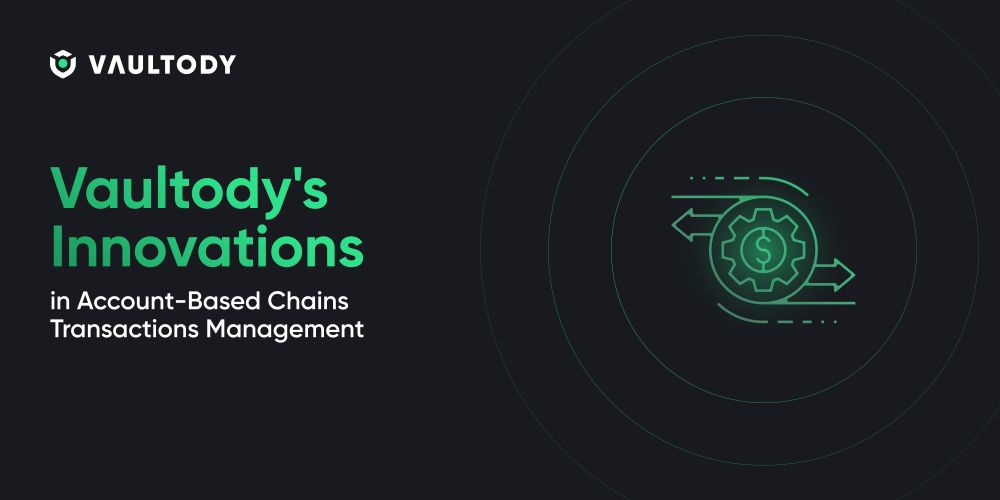In contrast to the UTXO protocol which we discussed previously, the account-based blockchains rely on a balancing management system that mimics the same principle of how traditional banking system operates. This means that transactions can be placed with the exact amount due to be paid. There won't be any changes from the transaction that senders receive upon completion, known as the unspent transaction outputs in UTXO protocols such as Bitcoin, Litecoin, Dogecoin, and others.
In account-based blockchains there is a balancing management system that controls accounts. Smart contracts also play a vital role in the process as they represent pre-coded and predefined network conditions which are triggered once these conditions are met. All smart contracts allow automation to be introduced to the relevant blockchains.
Vaultody integrates a multitude of advantages into its secure MPC vaults for clients. These include the utilization of smart contracts, offering benefits like cost efficiency, transaction speed, and innovative functionalities such as employing a unified address across all EVM chains and dust removal. All of this, secured with our in-house-built MPC technology to match the highest security standards in the industry.
Which blockchains are account-based?
Several of the most widely used account-based blockchain networks include Ethereum,, Binance Smart Chain, Solana, Optimism, and others. These networks all share a key feature: the ability to partially spend balances. This functionality enables users to make transactions involving only a portion of their total balance, rather than being required to spend entire amounts as is typical in UTXO-based transactions.
To illustrate, imagine you own 50 Ethereum coins but need to send 17.25 ETH to another party. In an account-based network, you can precisely transfer the desired 17.25 ETH without having to transact the entire 50 ETH, as would be necessary in a UTXO-based system. Consequently, after the transaction, the sender retains a balance of 32.75 ETH within their account. Unlike UTXO transactions, there is no need for the creation of a new address dedicated to storing change resulting from the transaction.
Please be aware that in the provided example, we have not included the transaction fee, which should be covered by the sender. This works in the following way in Vaultody - first, you need to create a transaction request which must be approved or rejected by the account owner (by default). The second step is concerned with the preparation of the transaction - during this stage the amount of the transaction and the payable gas fee are being calculated. It is important to note that the fee depends on the variables that were set by the transaction sender, the blockchain on which the transaction is broadcast, the transaction volume of the chain, as well as other factors that affect the value.
Once prepared, the transaction must be signed, and then the transaction will be broadcast to the blockchain until validators/crypto miners process/approve the transaction.
The transaction fee should be calculated in addition to the transacted amount of 17.25 ETH. In cases where the transaction fee is deducted along with the transaction amount, there may be a negligible balance remaining in the user's wallet, leading to what is commonly referred to as "wallet dust." This presents a prevalent challenge in the cryptocurrency sphere: the difficulty in spending tiny amounts of cryptocurrency. This is a challenge that Vaultody addresses and successfully solves. Continue reading to discover how.
Are account-based chains the same as EVM blockchains?
EVM, short for Ethereum Virtual Machine, serves as the backbone for executing smart contracts on the Ethereum blockchain. This foundational technology extends its compatibility to various blockchains, including Avalanche, Polygon, Binance Smart Chain, and numerous others.
Whilst EVM chains function as account-based blockchains owing to their compatibility with the Ethereum network, it's essential to recognize that not all account-based chains are necessarily EVM-compatible. A notable example illustrating this concept is the Solana blockchain, which operates as an account-based chain but is not compatible with the EVM architecture.
How exact amounts are transferred in account-based chains?
When a transaction is initiated on an account-based blockchain, it sets in motion a process where nodes execute the transfer by deducting the precise amount from the sender's account balance and crediting it to the receiver's account. Unlike UTXO-based systems where transactions involve the consumption of specific unspent outputs, in account-based chains, the transfer occurs directly between the sender's and receiver's account balances.
The account-based model exhibits greater efficiency compared to UTXO-based systems. This efficiency stems from the streamlined validation process wherein each transaction simply requires confirmation that the sender's account possesses adequate balance to cover the transaction amount. Unlike the complex verification involved in validating UTXO ownership and determining sufficient inputs for each transaction, account-based chains simplify the process by directly accessing account balances, resulting in quicker transaction confirmations and reduced computational overheads. This is why many are accepting Bitcoin as the “store of value” cryptocurrency, and Ethereum is considered as a global payments system.
Vaultody - Smart Vaults Benefits
Smart Vaults is one of our upcoming features that is coming soon. These vaults will be an integral part of our secure MPC solutions. Our Smart Vaults will support all smart-contract based EVM chains. Even the exception to the rule of an account-based but non-EVM compatible chain, Solana, will be supported.
Through Smart Vaults, we will introduce numerous improvements and new features that are new to the market. The list is inclusive of, but not limited to the following:
- Significant fees reduction on single transactions allowing you to generate very considerable savings
- The ability to perform batch transactions and the unique opportunity to make drastic reductions/cost-optimizations on gas fees
- Introducing our gas tanker, a groundbreaking solution designed to tackle one of the primary issues discussed earlier: the wallet dust. Whether you possess a single address or hundreds, even thousands or millions inside your vault(s), our ingenious gas tanker is strategically located in your account. It efficiently gathers wallet dust from all your addresses (also known as child addresses), enabling you to utilize your funds seamlessly.
- Easy and very quick to navigate and perform operations through our innovative and simplified dashboard
There are numerous features which run outside of the Smart Vaults, but as part of the overall Vaultody MPC solutions, such as the “Same address for all EVM chains”. This feature simplifies address usage across supported EVM blockchains, eliminating transaction errors. Vaultody clients can seamlessly manage assets, with the ability to return mistakenly sent funds. Exclusive to Ethereum Virtual Machine (EVM) compatible chains, this feature ensures address consistency and alignment across platforms, verifiable by comparing address symbols manually.









 Copy link
Copy link